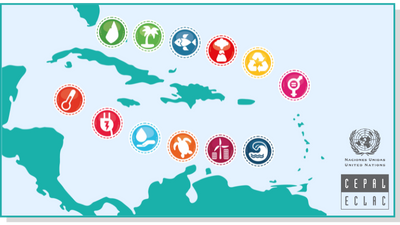SIDS relevant climate change and disasters indicators: the Caribbean situation
Área(s) de trabajo
Resumen
Organized by Statistics Division and the Caribbean Subregional Headquarte of ECLAC. This is a Side-event of the 52nd session of the United Nations Statistical Commission
Información del evento

Fecha
9 Feb 2021, 08:00 - 09:30Tipo de evento
Participación
Background
Compared to other regions of the world, Latin America and the Caribbean has historically made a minor contribution to climate change. Nonetheless, the region is acutely vulnerable to its negative consequences, particularly the small island developing States (SIDS) of the Caribbean that have been continuously impacted by hazardous events, such as tropical storms, floods or landslides.
So far, global focus on measuring GHG emissions has not provided much support to better measure climate change occurrences, impacts (including damages and losses), and adaptation indicators, which remain the most relevant issues for the Caribbean. The “Caribbean relevant climate change and disasters indicators for evidence-based sustainable development policies” project is focused on disaster statistics and incorporates Covid-19-related data and statistics as a natural component. The slow paces of development of new statistical methodologies, and the challenges with timeliness and quality of data among Caribbean countries, hamper the production and use of relevant indicators in informing policy decisions and actions that are aimed at addressing climate change and disaster vulnerability and building resilience. Institutionalizing sound evidence-based sustainable development policies in the Caribbean requires quality, timely, and accessible climate change and disasters indicators that are harmonized and comparable across countries.
As embodied in the “Caribbean First” strategy of the Economic Commission for Latin America and the Caribbean (ECLAC) and articulated by its Executive Secretary on many occasions, the Caribbean subregion is a priority in ECLAC’s programme of work. Given the statistical capacity challenges of most Caribbean countries, ECLAC (Division of Statistics and Caribbean Subregional Headquarters) is launching this new project (2021-2023) with a focus on supporting capacity building of the national statistical systems of non- Spanish-speaking Caribbean countries to institutionalize climate change and disaster-related data collection and indicators production. Building on the current work already undertaken by important stakeholders of the region, such as the CARICOM and the United Nations Statistics Division, the project will also aim at enhancing the capacity of policy makers to use these indicators for more effective climate change and disaster risk reduction actions, thereby contributing to the coherent implementation and monitoring of the Sustainable Development Goals, the Paris Agreement, the Sendai Framework for Disaster Risk Reduction, the SIDS Accelerated Modalities Of Action (SAMOA) Pathway and other international agreements.
Objectives
- To further the understanding of the opportunities and challenges related to climate change and disasters indicators production in the Caribbean.
- To showcase the latest available evidence on measuring climate change (drivers, occurrence, impacts, vulnerability, mitigation and adaptation) and disasters in the Caribbean.
- To explore the links between statistical production and policymaking related to climate change adaptation and resilience.
- To discuss innovations and ways to improve climate change and disaster statistics and indicators production in the SIDS context.
Target audience
The side-event targets SIDS and especially Caribbean member States. Key national stakeholders include representatives from National Statistical Offices, Disaster Risk Reduction/Emergency authorities and the Environment and Climate Change Ministries. Additionally, other stakeholders such as representatives of sectoral authorities and Ministries are welcome to join (i.e. health, water, forest, fisheries/aquaculture, coastal/seas, tourism, agriculture, meteorology authorities, as well as universities, research centers and other stakeholders related to the production and use of climate change and disaster indicators and their underlying statistics).
Programa de trabajo
1. Introduction
» Moderator: Pauline Léonard, Statistics Division of ECLAC
[[{"fid":"99433","view_mode":"default","fields":{"format":"default","alignment":"center"},"type":"media","field_deltas":{"1":{"format":"default","alignment":"center"}},"attributes":{"class":"media-element file-default media-wysiwyg-align-center","data-delta":"1"}}]]
Presentation(s)
Presentation of the project “Caribbean relevant climate change and disasters indicators for evidence-based sustainable development policies”
Introduction to the regional situation of climate change and disaster statistics in Latin America and the Caribbean
2. Deepening the assessment of the regional situation of climate change and disaster statistics
Presentation(s)
Climate change and disaster metrics in Latin America and the Caribbean
The CARICOM subregional experience in producing its first Climate Change
A sub-regional environment information system in the OECS
3. Situation, opportunities and challenges of the climate change and disaster indicators production in selected countries of the Caribbean: users and producers perspectives
Presentation(s)
The need for climate change and disaster information for evidence - based policies
A national compendium of climate change statistics in Jamaica
4. Comments and questions of the participants
Moderator: Abdullahi Abdulkadri, Coordinator of the Statistics and Social Development Unit, ECLAC subregional headquarters for the Caribbean
5. Final remarks and closing of the meeting
Enlace(s) relacionado(s)
Institución organizadora
Comisión Económica para América Latina y el Caribe (CEPAL)
- https://www.cepal.org
- 56 222100000